Politics
/ArcaMax
Trump fires US Copyright Office chief Perlmutter, Politico says
President Donald Trump fired the top official at the U.S. Copyright Office on Saturday, Politico reported.
The termination of Shira Perlmutter on Saturday came two days after Trump fired the head of the Library of Congress, which has oversight of the copyright office, the report said. The White House did not respond to Politico’s request for ...Read more
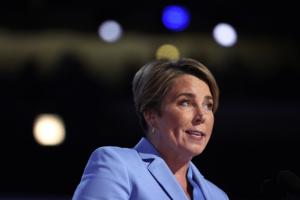
Trump vs. Massachusetts: Brazilian child rapist in home day care ICE flashpoint
BOSTON — The governor is being called out for the “appalling” case of an illegal immigrant child rapist found at a Cape Cod home day care.
It’s a startling arrest, Gov. Maura Healey’s administration argued Friday night, that dates back to the waning months of the Biden presidency that’s now being highlighted as Massachusetts, Boston...Read more
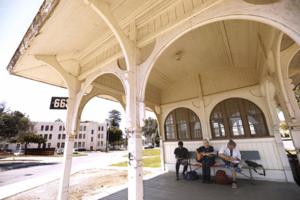
Trump executive order envisions housing homeless veterans at VA center in West LA
LOS ANGELES — President Donald Trump signed an executive order Friday directing the Department of Veterans Affairs to create a center for homeless veterans on its West Los Angeles campus.
The order set a goal of housing up to 6,000 homeless veterans at the center, which Trump named the National Warrior Independence Center, and ordered federal...Read more
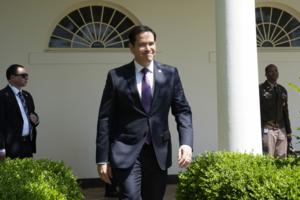
Once-powerful NSC is sidelined by Trump as Rubio takes the helm
President Donald Trump is taking his time naming a permanent replacement for his national security adviser. But he’s already sent a clear message: the job once held by figures like Henry Kissinger and Zbigniew Brzezinski won’t matter in his administration nearly as much.
Even before he removed Mike Waltz from the post on May 1, the ...Read more
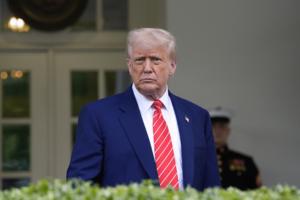
Trump must halt mass layoffs of federal workers, judge rules
The Trump administration must temporarily cease from engaging in widespread layoffs and firings for government workers, a California federal court ruled Friday.
President Donald Trump’s February executive order calling for a radical reorganization of the federal workforce likely violates the Constitution, Judge Susan Illston of the U.S. ...Read more
South Korea conservatives reportedly agree to unify presidential campaign
South Korea’s conservative presidential hopefuls have agreed to end their rift, Yonhap News Agency reported, uniting behind a single candidate ahead of a snap election triggered by the impeachment of the country’s former president.
People Power Party nominee Kim Moon-soo won a vote among rank-and-file members, prompting former Prime ...Read more
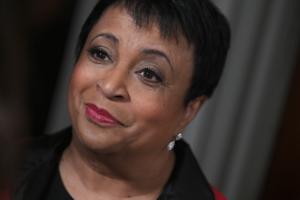
Trump fired the Librarian of Congress. Now Democrats want to change the hiring process
WASHINGTON — Donald Trump’s abrupt firing of Librarian of Congress Carla Hayden has reignited an effort in Congress to wrest back power from the executive branch and assert more control over legislative branch agency heads.
Democratic lawmakers blasted Trump’s decision, and some are vowing to change the way positions like the librarian of...Read more

Fate of Gaza will hang over Trump's Middle East swing
WASHINGTON — As he prepares to jet off Monday on his first working foreign trip of a breakneck second term, President Donald Trump will be met head-on with the uncertain future of war-torn Gaza and its beleaguered residents — as congressional Democrats remain flummoxed by his emerging foreign policy approach.
Trump chose Saudi Arabia and ...Read more
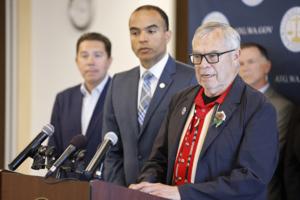
Washington, 14 other states sue Trump over his order to shortcut reviews on fossil fuel projects
SEATTLE — Washington is leading 14 other states in a new lawsuit challenging President Donald Trump’s executive order declaring a “national energy emergency” and seeking to shortcut environmental reviews for oil drilling, pipelines and other fossil fuel projects.
The lawsuit, announced by Attorney General Nick Brown at a news conference...Read more
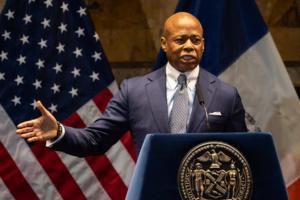
Trump says Mayor Adams came to White House to 'thank' him after indictment dismissal
President Donald Trump said New York City Mayor Eric Adams came to the White House on Friday so the mayor could “thank” him in the wake of the dismissal of Adams’ federal corruption indictment.
“Almost nothing,” Trump told reporters in the Oval Office when asked what he and Adams discussed during their brief sit-down earlier in the ...Read more

Hollywood's chaotic week of Trump, tariffs and tax break talk ends with no clear direction
It's been a chaotic week in Hollywood.
Less than a week ago, President Trump called for 100% tariffs on movies made outside the U.S., a move meant to bring productions home that most people in the industry believe would have devastating consequences for the entertainment business.
Then industry trade publication Deadline published the "Make ...Read more

Trump's firing of Hayden brings culture wars to the Library of Congress
Republicans have waged a yearslong battle against cultural institutions. It reached an abrupt zenith on Thursday night.
President Donald Trump’s firing of Librarian of Congress Carla Hayden on Thursday marked the arrival of the conservative culture wars to the world’s largest library. At its core was the intersection of Trump administration...Read more

Woman inspired by Luigi Mangione planned to kill Trump Cabinet members, feds say
A week after President Donald Trump’s inauguration, a woman turned herself in to U.S. Capitol Police, revealing she had a knife, two “Molotov cocktails” and planned to kill Trump Cabinet members, court documents say.
It was a plan she said was inspired by Luigi Mangione, who is facing federal charges in the fatal shooting of United ...Read more
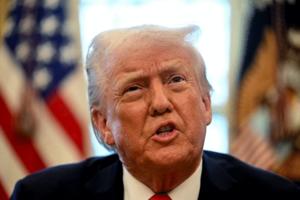
Trump flip-flops on millionaire tax hike amid GOP budget feud
President Donald Trump flip-flopped again Friday on a controversial tax hike on millionaires as congressional Republicans struggle to reach agreement on a sprawling budget bill.
Just two days after saying he backs higher tax rates for the wealthiest Americans, Trump softened his stance.
Trump conceded in a social media post that the higher tax...Read more
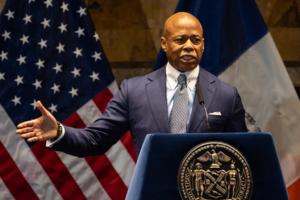
Mayor Eric Adams to meet with Trump at White House to discuss 'NYC priorities'
Mayor Eric Adams is slated to meet with President Donald Trump at the White House on Friday afternoon to “discuss New York City priorities,” his office announced.
The meeting is expected to last just 30 minutes, a source briefed on the matter told the Daily News. Among other issues, the source said Adams plans to talk to Trump about a need ...Read more
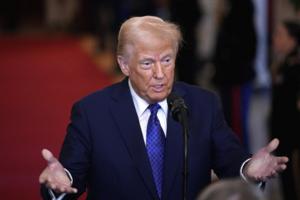
Whether it's his plan or not, Trump's policies so far closely align with Project 2025
In his Project 2025 chapter on trade, economist Peter Navarro called on the next U.S. president to bring about a domestic manufacturing "renaissance" by adopting reciprocal tariffs against trading partners and taking a particularly hard line on China.
Promptly after being elected, President Donald Trump appointed Navarro as his senior counselor...Read more
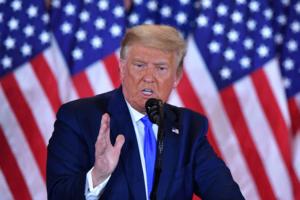
5 ways the Trump administration is implementing Project 2025
Whether Project 2025 was President Donald Trump's plan for his second presidency was a big point of contention during the presidential campaign.
His opponents in the race — first President Joe Biden and then Vice President Kamala Harris — aggressively tried to tie him to the Heritage Foundation's unpopular conservative playbook, which was ...Read more

Editorial: Congress, defend PBS. We knew you could
"I'm very much concerned, as I know you are, about what's being delivered to our children in this country," said Fred Rogers to the U.S. Senate Subcommittee on Communications in May 1969. "We don't have to bop somebody over the head to ... make drama on the screen."
Public broadcasting, Rogers argued, was crucial because it cared about "trying ...Read more

Trump fires Librarian of Congress and Baltimorean Carla Hayden
President Donald Trump fired Baltimore native and Librarian of Congress Carla Hayden on Thursday, according to statements from House Democrats.
The longtime Baltimorean, who served as the CEO of the Enoch Pratt Free Library from 1993 until President Barack Obama nominated her to head the Library of Congress in 2016, was the first woman, and ...Read more

Trump abruptly fires Librarian of Congress Carla Hayden
President Donald Trump has fired Carla Hayden, the longtime head of the Library of Congress, in a move that Democratic lawmakers panned as “callous” and “ignorant.”
House Minority Leader Hakeem Jeffries, D-N.Y., described Hayden as “accomplished, principled and distinguished” in a statement Thursday night.
“Donald Trump’s ...Read more
Popular Stories
- Trump vs. Massachusetts: Brazilian child rapist in home day care ICE flashpoint
- Whether it's his plan or not, Trump's policies so far closely align with Project 2025
- 5 ways the Trump administration is implementing Project 2025
- Once-powerful NSC is sidelined by Trump as Rubio takes the helm
- Trump must halt mass layoffs of federal workers, judge rules


























































